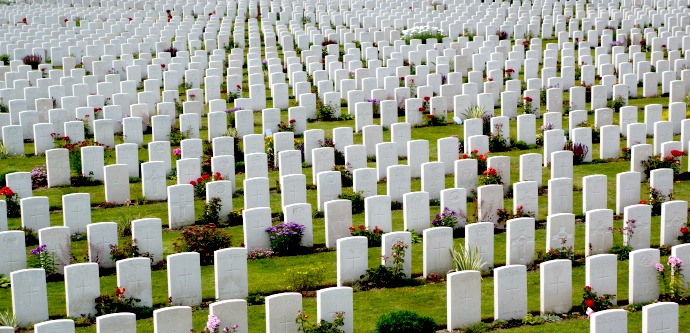Joe Tibbetts
Tuesday, June 10, 2014
11:06 GMT
Joe Tibbetts is the founder and CEO of CLGdotTV. He hosts Working Lunch and chairs AnswerTime the CLGdotTV panel show. Joe chairs conferences and advises public and private sector organisations on how to get heard.
@Joe_TibbettsThe Old Lie


SHARE
Image:© Thoma Quine - All that remains - Belgium 2014
As Vladimir Putin hands out medals for "the war in Syria" we take the opportunity to republish a leader first published June 2014 the 70th anniversary of the D-Day landings.
People die in war because they go to war. They go to war because of the criminal stupidity, deluded vanity, weakness, moral vacuity, selfishness and psychopathic lack of empathy exhibited by national leaders.
Our 'leaders’ have taken the 70th anniversary of D-Day as a god-sent photo opportunity, and the broadcasters have lined up on the beach to give them airtime to deploy their soundbites.
My generation's parents and grandparents talked about both the “world” wars regularly. And what they spoke of was rarely anything but misery. Some of my friend’s families had large bits missing; an older brother, a father, a whole family on the mother’s side. For my generation, the immediate post WWII generation, being anti-war was a given.
Most of my school teachers had lived through the second world war, many had fought and one or two showed clear evidence of wear and tear. One had lost the front of his head in a bomb disposal accident that peeled off the palms (but not the backs) of both his hands and neatly removed his face above the jaw.
The reconstructive surgery must have been unimaginably painful. The result was a jumble of diced facial remnants, arranged on a large flattish area of skin (clearly harvested from a different part of his anatomy) and stretched over a steel plate set in the front of his skull. A face, in fact, straight out of a horror movie. He was a difficult man. How could he have been anything else? But he was a hero to us schoolboys not because he went to war but because he could mock himself for the circumstances of the accident that had destroyed his face and who refused to let a small problem like blindness and a “stop you in your tracks” disfigurement, destroy his life.
In 1966, the Oxford and Cambridge examination board set-texts for English Literature included The Poems of Wilfred Owen. A couple of years later I wrote a dramatization of Owen's life, cast myself in the lead role and took it to the Edinburgh Festival, funded by a grant from the National Union of Students. The finale to this work of borrowed genius was a rendering of Dulce et Decorum est given down-stage -centre within spitting distance of the first of the three short rows that made up the audience.
I delivered the last fourteen lines of the double sonnet as a piece of tub-thumping demagoguery. The old theatre trope not a dry eye in the house was, for once, a simple statement of fact. It is difficult to imagine anything having a similar effect on a Fringe audience today. For anyone born between, say, 1930 and 1950, both world wars were very present in everyday life.
Most of the acts of remembrance marking the 70th anniversary of the D-Day landings have talked about the terrible losses and the suffering and the reasons why people died. They died "for freedom", we are told: "for France", "for England", "in defence of a principle", "in defence of homeland and hearth", "to aid their allies", "to save the world for civilization" all of which are the truth but not the whole truth which should include - "to serve some politician's agenda".
It would be all too easy to look at the morally flabby line-up of Cameron, Merkel, Hollande, Putin, Obama et al and pick Putin as the hypocrite du jour. But which of those leaders lining up for the cameras, on the beach in more ways than one, could claim that they have not already or will not in the future speak, with such high zest, to children ardent for some desperate glory, the old lie; Dulce et Decorum est Pro patria mori.






